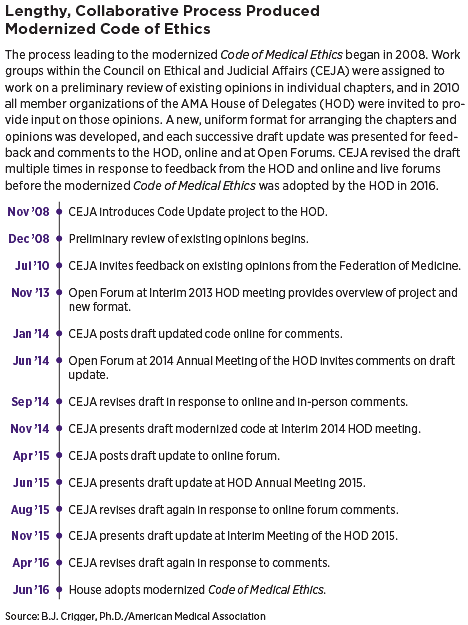The Code of Medical Ethics, the document that since 1847 has reflected the American medical community’s understanding about the ethical practice of medicine, has been fully updated for the first time in 60 years.
The update of the Code began in 2008 and involved a labyrinthian process of review and refinement by the American Medical Association’s Council on Ethical and Judicial Affairs (CEJA), the AMA House of Delegates, and ongoing feedback from AMA members and others. The result—receiving final approval at last year’s Annual Meeting of the House of Delegates—is an 11-chapter manual containing 161 opinions on the ethical conduct of practitioners of contemporary medicine.
The Code includes opinions on topics as diverse as reporting clinical test results, withholding or withdrawing life-sustaining treatment for patients with terminal illness, use of social media, telemedicine, umbilical blood banking, and physician stewardship of health care resources.
In interviews with Psychiatric News, B.J. Crigger, Ph.D., who is the director of ethics policy at the AMA and secretary to CEJA, and psychiatrist Jim Sabin, M.D., a member of CEJA, described an iterative process in which outdated opinions were jettisoned, multiple opinions addressing the same subject were condensed, and the language of the new Code was revised using a uniform style presentation.
Sabin said the update should be of interest to psychiatrists because APA’s Principles of Medical Ethics With Annotations Especially Applicable to Psychiatry are essentially the AMA Code with opinions that are specifically relevant to psychiatry.
“The format of the modernized Code is going to be useful to psychiatry and to the APA code because, in the updated version, the ethical underpinnings of the opinions stand out more clearly,” he said. “I hope and expect that as new ethical issues emerge from the perspective of psychiatry, the AMA Code will be a source of even more valuable guidance than it has been in the past because of the way it has been revised to emphasize the underlying ethical principles.”
A prominent example of ethical opinions that were removed in the update were most of those dealing with genetics. “Many of the opinions on genetics and medicine relied on science from the 1980s that was no longer reflective of contemporary scientific understanding,” Crigger said.
In other areas, the prior Code contained multiple opinions on the same topic. For instance, there were six separate opinions on ethical responsibilities in managing medical records, and these opinions overlapped significantly in content. The unique guidance of the individual opinions was distilled to create a single, overarching opinion.
Crigger emphasized that the modernized Code is grounded in the AMA Principles of Medical Ethics (see sidebar) which are not laws, but standards of conduct that define the essentials of ethical behavior for physicians. She said one of the most critical (and time-consuming) aspects of updating the Code was the effort to emphasize throughout that the ethical opinions are not guidelines for clinical practice, let alone laws dictating how physicians must behave in every situation.
“For the first time, the modernized AMA Code of Medical Ethics addresses practical concerns about interpreting its guidance,” she said. “In a new preface that describes the use of key terms and offers examples, the modernized Code explicitly acknowledges that no guidance can ever be fully self-interpreting. It recognizes that fundamental ethical challenges can present themselves in different guises to physicians in different specialties or contexts of practice.”
New Opinions Formulated Alongside the Update
The process leading to the modernized Code was a laborious one that began in 2008 (see chart). Work groups within CEJA were first assigned to conduct a preliminary review of existing opinions in individual chapters, and in 2010 all member organizations of the AMA House of Delegates were invited to provide input on those opinions.
CEJA developed a new, uniform format for arranging the chapters and opinions, and in 2013 an Open Forum was held providing an overview of the update process and describing the new format. Between 2013 and 2016, CEJA revised the Code four times, each time incorporating comments and criticism from the House of Delegates and from comments received online. The revised Code was adopted at AMA’s 2016 Annual Meeting in June; each new revision by CEJA in response to the House was also placed online for comment.
The final result is a more streamlined AMA Code with 161 opinions (down from more than 200 in the prior Code), in 11 chapters. The chapters include opinions on the following topics:
•
Patient-Physician Relationships
•
Consent, Communication, and Decision-Making
•
Privacy, Confidentiality, and Medical Records
•
Genetics and Reproductive Medicine
•
Caring for Patients at the End of Life
•
Organ Procurement and Transplantation
•
Physicians and the Health of the Community
•
Professional Self-Regulation
•
Inter-professional Relationships
•
Financing and Delivery of Healthcare
Even as the Code was being updated and modernized, new opinions were still being formulated and debated within the Council and the House of Delegates, such as opinions on physician stewardship of health care resources, and allocation of scarce health care resources.
Sabin, who has written extensively about the subject of ethical stewardship of finite resources, said he believes those opinions in the updated Code represent an important evolution in the way physicians think about their responsibility to the health of the individual patient as well as the broader public.
Sabin said the lengthy process of updating the Code is one psychiatrists should admire. “I have been very impressed with the process of code modernization at the AMA,” he said. “It relied on dialogue within a large organization engaging a lot of different parties and voices, and a process of give and take with which we in psychiatry are very familiar.” ■
The full text of The
Code of Medical Ethics can be downloaded at no cost
here. A print copy of
The Code of Medical Ethics can be purchased from the AMA.

